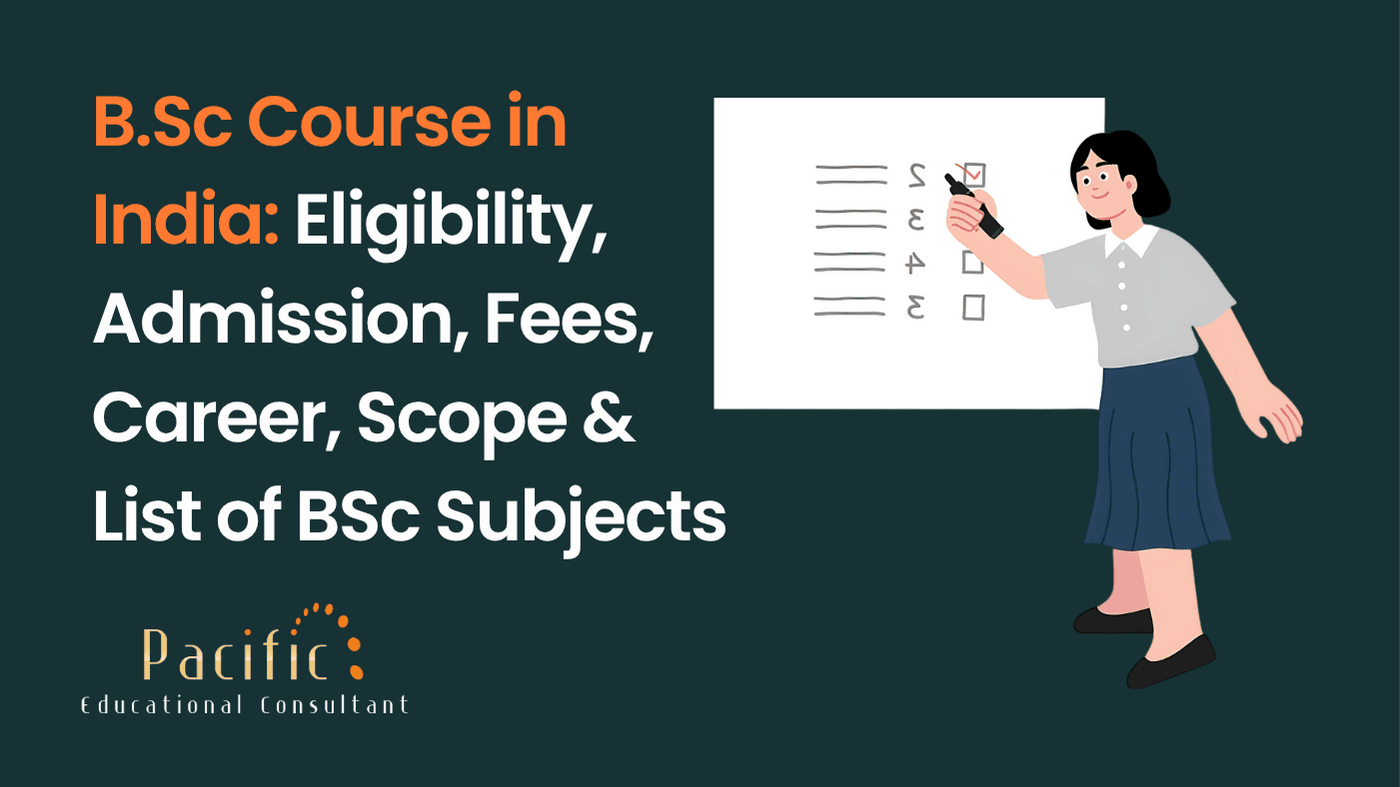


The Bachelor of Science (BSc) degree is one of India’s most versatile undergraduate programs. It offers students a strong foundation in scientific principles and practical skills. In this guide, you’ll discover the List of BSc Subjects, eligibility criteria, admission process, fee details, and career scope after completing the course.
A BSc (Bachelor of Science) is a three-year undergraduate degree that focuses on the study of science and related disciplines. The course is divided into six semesters and is available in various streams like BSc General, BSc Honours, and BSc Research.
Students can specialize in core science areas such as Physics, Chemistry, Biology, and Mathematics, or choose from advanced domains like Data Science, Biotechnology, or Computer Science.
To apply for a BSc course, students must meet the following eligibility requirements:
| Criteria | Details |
| Qualification | 10+2 in Science stream (Physics, Chemistry, Mathematics/Biology) |
| Minimum Marks | 50%–60% aggregate (depending on college) |
| Subject Requirement | PCM for physical sciences, PCB for life sciences |
| Age Limit | No upper age restriction in most universities |
Some specializations like BSc Agriculture or Nursing may include additional criteria such as entrance tests or interviews.
Admission to BSc courses happens through merit-based selection or entrance exams.
Steps to apply:
Register on the college or university website.
Submit academic details and required documents.
If applicable, appear for entrance exams such as CUET or state-level tests.
Check the merit list or cutoff marks.
Confirm admission by paying the course fee and completing verification.
The BSc course fees depend on the type of college, location, and specialization.
| Type of Institution | Annual Fee Range |
| Government Colleges | ₹5,000 – ₹50,000 |
| Private Colleges | ₹50,000 – ₹2,00,000 |
| Specialized Courses | ₹80,000 – ₹3,00,000 (with lab & research components) |
Specializations such as Biotechnology, Forensic Science, and Computer Science often have higher fees due to laboratory and equipment requirements.
The List of BSc Subjects covers a wide variety of disciplines across physical sciences, life sciences, and applied sciences. Students can choose their subjects based on interests and career aspirations.
Physics
Chemistry
Mathematics
Biology (Botany & Zoology)
Computer Science / Information Technology
Microbiology
Biotechnology
Genetics
Data Science / Statistics
Environmental Science
Home Science
Nutrition and Food Technology
Agriculture / Horticulture
Psychology
Forensic Science
Geology / Geography
Biochemistry
Economics (available in select colleges)
| Category | Example Subjects |
| Core Subjects | Physics, Chemistry, Mathematics, Biology |
| Elective Subjects | Statistics, Microbiology, Environmental Science |
| Specialized Fields | Biotechnology, Data Science, Forensic Science |
The List of BSc Subjects gives students the flexibility to pursue areas that align with their career goals—whether in research, applied sciences, or technology-driven sectors.
Pursuing a BSc from abroad provides international exposure, advanced laboratory experience, and access to global research facilities. Many universities in the USA, UK, Canada, Australia, and Germany offer world-class BSc programs in modern disciplines.
| Country | Popular BSc Specializations |
| United States | Data Science, Computer Science, Physics, Environmental Science |
| United Kingdom | Biotechnology, Chemistry, Biomedical Sciences, Mathematics |
| Canada | Life Sciences, Earth Sciences, Psychology, Agriculture |
| Australia | Marine Biology, Environmental Science, Genetics |
| Germany | Engineering Sciences, Biochemistry, Applied Physics |
Duration: 3–4 years (depending on country)
Annual Tuition: ₹10–25 lakh (varies by university and course)
Scholarships: Merit-based or need-based scholarships available for international students
A BSc from abroad enhances career prospects, offering global recognition and opportunities in research institutions, multinational corporations, and academia.
A BSc degree opens multiple career paths in both public and private sectors. Graduates can work in research, education, technology, or healthcare.
| Job Role | Key Responsibilities |
| Research Assistant / Scientist | Conduct laboratory experiments and scientific analysis |
| Lab Technician / Chemist | Perform testing, data collection, and reporting |
| Data Analyst / Statistician | Analyze and interpret data for decision-making |
| Lecturer / Assistant Professor | Teach science subjects at colleges and universities |
| Clinical Research Associate | Support pharmaceutical and biotech trials |
| Environmental Specialist | Work on sustainability and ecological conservation projects |
Entry-Level: ₹2 – ₹4 LPA
Mid-Level: ₹5 – ₹8 LPA
Experienced / Specialized Roles: ₹10 LPA or higher
After completing a BSc, students can pursue:
MSc in a chosen specialization
MBA for management-oriented roles
Professional Courses like Data Science, AI, or Clinical Research
Competitive Exams such as UGC NET, CSIR NET, or GATE
These qualifications enhance job prospects in academia, research, and industry.
Understanding the List of BSc Subjects helps you choose the right specialization that matches your academic interests and career ambitions. A BSc degree builds strong analytical, practical, and research skills that are valued across industries.
Next, explore how to select the best BSc specialization for your career growth and skill development.

Canada Super Visa in Kota | Parents & Grandparents Visa Experts

Malaysia Study Visa Requirements – Fees, Process, Bank Balance

MDS in Germany : Fees, Licensing, Salary & Eligibility for Indian Dentists

PTE Reading Tips and Tricks: How to Improve PTE Reading Score

Best Architecture Colleges in the World: Ranking, Fees & Admission

Top GMAT Accepting Colleges in World for MBA

Fully Funded PhD Scholarships Abroad for Indian Students

MBA in Project Management in UK: Top Universities, Fees & Jobs

Top 10 Universities for MBA HR in Canada | Eligibility & Process

MS in Agriculture in Australia: Top Universities, Scholarships & Jobs